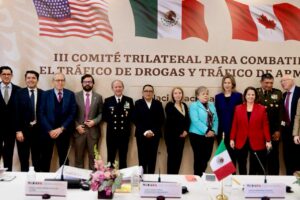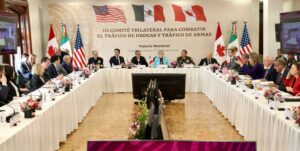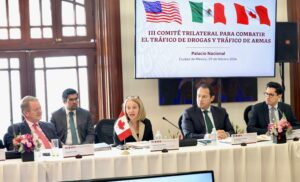From: Privy Council Office
Statement
February 9th, 2024 – Mexico City, Mexico – On February 7, 2024, Mexico’s Secretary of Security and Citizen Protection Rosa Icela Rodriguez hosted the United States’ White House Homeland Security Advisor Dr. Elizabeth Sherwood-Randall and Canada’s Deputy Clerk and National Security and Intelligence Advisor Nathalie G. Drouin in the fourth meeting of the Trilateral Fentanyl Committee to review progress on our commitments and discuss further joint actions to counter the flows of illicit synthetic drugs and illegal firearms in North America.
President Joe Biden, President Andrés Manuel López Obrador, and Prime Minister Justin Trudeau established the Trilateral Fentanyl Committee in January 2023, during the North American Leaders’ Summit (NALS), to guide priority actions to address the threat from illicit synthetic drugs, including fentanyl, in North America.
The United States, Mexico, and Canada commit to increasing collaboration on the control of precursor chemicals and equipment related to illicit drug production, continuously reviewing our legal frameworks to identify areas for improvement, and further engaging the private sector to combat the production of illicit synthetic drugs. We are also working to strengthen diplomatic efforts to build on the progress of the Global Coalition to Address Synthetic Drug Threats. To advance public health, we are committed to developing and implementing a common drug and substances analysis protocol, which will allow toxicologists from the three countries to improve our understanding of regional drug trends. In addition, we plan to convene a forum to discuss strategies and their implementation for assisting the long-term recovery of individuals with substance use disorders.
Our governments have expanded the scope of the Trilateral Fentanyl Committee to address firearms trafficking associated with illicit drug production and distribution under the auspices of the North American Drug Dialogue. As an important first step, we commit to developing a trilateral report that documents cross-border firearms seizures in all three countries. The report will broaden our strategic understanding of the corridors and methodologies used for trafficking drugs and firearms and the criminal organizations involved to better inform our actions. We also commit to increase our use of the U.S. Department of Justice’s Bureau of Alcohol, Tobacco, Firearms and Explosives’ (ATF) eTrace database to allow for more and faster joint investigations into the illicit trafficking of firearms across our borders. In addition, to increase and expedite information sharing on criminals and illicit activities associated with trafficking of fentanyl and firearms, the United States invited Mexico to embed personnel at the U.S. Customs and Border Protection National Targeting Center, joining Canadian personnel who are already embedded there.
We are optimistic that our ongoing collective efforts will help improve the security and health of our citizens and communities. Together we will work aggressively to stem the flow of illicit fentanyl, precursor chemicals, and firearms across our shared borders; increase investigations and prosecutions of criminals behind these heinous crimes; and support individuals who are affected by these crimes and those in recovery.
Mexico’s delegation was led by Secretary of Security and Citizen Protection Rosa Icela Rodriguez and included Secretary of Foreign Affairs Alicia Bárcena Ibarra; Attorney General of the Republic Alejandro Gertz Manero; Secretary of the Interior Luisa María Alcalde; Secretary of National Defense Luis Cresencio Sandoval; Secretary of the Navy José Rafael Ojeda; Secretary of Health Jorge Alcocer; Undersecretary of Human Rights, Population and Migration Arturo Medina; Federal Commissioner for Protection against Sanitary Risks, Alejandro Svarch; Head of Unit for North America Roberto Velasco; Mexican Ambassador to the United States Esteban Moctezuma; and Mexican Ambassador to Canada Carlos Joaquin González.
The United States’ delegation was led by White House Homeland Security Advisor Dr. Elizabeth Sherwood-Randall and included Deputy Secretary of State for Management and Resources Richard Verma; Deputy Attorney General Lisa Monaco; Acting Deputy Secretary of Homeland Security Kristie Canegallo; Deputy Director of the Office of National Drug Control Policy Adam Cohen; Ambassador to Mexico Ken Salazar; Ambassador to Canada David Cohen; National Security Council Senior Director for Counterterrorism and Transnational Crime Tiffany Eppelheimer, among others.
Canada’s delegation was led by Deputy Clerk and National Security and Intelligence Advisor to the Prime Minister Nathalie Drouin and included Public Safety Canada Associate Deputy Minister Tricia Geddes; Health Canada Associate Deputy Minister Eric Costen; Ambassador Graeme C. Clark; Deputy Head of Mission Shauna Hemingway; Chief of Staff to the Deputy Clerk and National Security and Intelligence Advisor to the Prime Minister Marie-Claude Filion; Political Counsellor Peter McKernan; and Counsellor Daniel Hallman.



